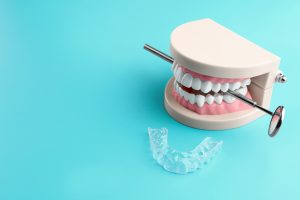 Your smile is one of your greatest assets, and it is certainly one that requires consistent care. After all, the list of factors that pose a major threat to your teeth far exceeds the list of items that are beneficial. While many understand that common concerns such as decay and gum disease are often the most persistent and obvious threats, there exist a myriad of other concerns that one might not initially think of, including bruxism. In today’s blog, your Dallas, TX dentist takes a look at the major issues that arise from incessant teeth-grinding, and how it can lead to a dangerous jaw dysfunction.
Your smile is one of your greatest assets, and it is certainly one that requires consistent care. After all, the list of factors that pose a major threat to your teeth far exceeds the list of items that are beneficial. While many understand that common concerns such as decay and gum disease are often the most persistent and obvious threats, there exist a myriad of other concerns that one might not initially think of, including bruxism. In today’s blog, your Dallas, TX dentist takes a look at the major issues that arise from incessant teeth-grinding, and how it can lead to a dangerous jaw dysfunction.
Increased Chances of Infection
When an individual experienced bruxism – the name given to chronic teeth-grinding – what is occurring is that they are clenching their oral structures tightly as their lower mandible moves from side-to-side, generating friction. Studies have indicated that bruxism can be indicative of the body’s response for survival. This is true, for example, if one’s airway were to become blocked and not enough oxygen was reaching the brain. When we grind, the muscles in our throat tighten, thus re-opening the airway.
One of the more obvious concerns that arises from bruxism involves wearing down the surfaces of your teeth. With time and without treatment, one becomes more susceptible to breakage, including chips and cracks. What’s more, you can experience increased chances of infection, as oral bacteria target the weakened structures and go to work breaking them down even more. For more information about this process, contact our team today.
Difficulty in Function
Another issue that arises when one grinds their teeth incessantly includes increased functional difficulty. You may awaken with a sore or tense jaw, and likely may not be able to fully open your mouth for daily activities such as eating or speaking. As the condition gets worse, however, you may even become subject to a dangerous jaw dysfunction. If you are experiencing bruxism, please reach out to our team to learn your options.
Possible Jaw Dysfunction
Your lower jaw hinges to your cranium at two main joints known as your temporomandibular joints (TMJs). Bruxism causes the mandible to become misaligned with these joints, resulting in a popping or clicking sensation as the jaw attempts to correct the concern. Over time, you will begin to incur tissue damage as well as pain.
Fortunately, there are solutions that can help such as guided splint therapy or a bruxism appliance to prevent the development of TMJ disorder in the first place. Reach out to your dentist to learn more about what you can do to preserve your natural grin.
Learn More Today
Contact Gentle Smiles Family Dentistry in Dallas, TX by calling 972-329-7645 to learn more or to schedule your appointment with our team today.






Recent Comments